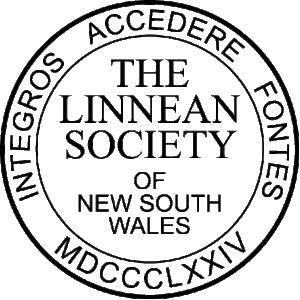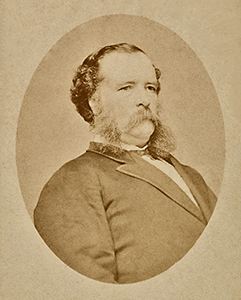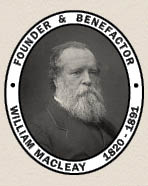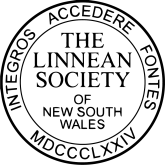
Grants are available from the William Macleay Microbiology Research Fund to support original research in an Australian natural history context within the field of Microbiology.

Applications will be accepted from postgraduate and Honours degree students at recognised Australian Universities who are undertaking full-time or part-time studies with a microbiological emphasis.
Applications are also encouraged from amateur or professional microbiologists, whether in employment as such or not, who can demonstrate a level of achievement in original research in Microbiology.
In awarding grants, the Council of the Society will assess:
a) Realistic costing and timetable
b) The quality of the project
c) The applicant’s ability to carry it out
d) The likelihood that successful completion of the research will lead to publication or other useful dissemination of research findings.
The total amount of Fund money available for awards in any year will depend on income received by the Fund over the preceding year and thus the maximum per application may vary from year to year. The current limit is $2000. Successful awards may be less than the amount requested when quality applications exceed money available.
Money awarded must be used for research purposes, which may include the purchase of equipment, laboratory or other consumables, and fieldwork or travel within Australasia. Requests for subsistence (i.e. food and lodging), travel to conferences, or thesis preparation expenses, will not be supported.
Applications are not restricted to members.
The closing date for applications is March 1 in any year. In exceptional circumstances, emergency support may be available at other times, subject to funds being available. Please contact the Secretary before submitting an emergency application.
Applications must be made on the Fund’s application form. Supporting documents should be added to the end and the entire application is to be submitted as a single PDF file.
The application must include a short summary (up to 200 words) of the project, to be published in the LinnSoc News if the applicant is successful.
Any publication arising from work supported by the William Macleay Microbiology Scientific Research Fund should include an acknowledgement to that effect.
Any type material generated by studies supported by these grants must be lodged in the collections of an appropriate scientific institution.
An application form may be obtained from the website or from the Secretary of the Society.
The Council’s decision in regard to the award or non-award of grants from the William Macleay Microbiology Scientific Research Fund is final, and no correspondence will be entered into. Council reserves the right to transfer any application to another fund where this is relevant and improves the likelihood of success.
Submit your signed application by email to secretary@linneansocietynsw.org.au
Click here to download the Macleay Application Form
Details of previous awards can be downloaded here
History of the Fund
In 1890, Sir William Macleay left an endowment of 12,000 Pounds to the University of Sydney to establish a Chair or Lectureship of Bacteriology. He was convinced of the extreme importance of this then fledgling science, but doubted that others held this view so he set strict conditions on his bequest.
The Senate of the University of Sydney accepted the bequest but in 1894 sought to have one of the conditions modified in the Equity Court. This was Sir William’s condition that “… It shall be necessary for every student before being admitted to a Science or Medical Degree at the University to attend a six months course of Bacteriology”. The Senate requested the court to rule on whether “Science Degree” meant science generally or just biological science. The judge ruled in favour of biological science. The other request was to define “a six months course of Bacteriology”. It was put to the court that the science of bacteriology, in its then state of development, could not profitably fill a six months’ course. The judge ruled in favour of Sir William’s original intention. In 1895, the Senate returned the bequest to the executors, who, following directions in Sir William’s will, passed the money to the Linnean Society of New South Wales to provide a salary for a position to be called ‘The Bacteriologist to the Linnean Society’. The Society set up its own laboratory in Linnean House, Elizabeth Bay, and employed a bacteriologist to conduct original research and to give instruction to one or two pupils. A full account is given in the Presidential Addresses of March 1895 and March 1896. The first Macleay Bacteriologist (1898-1927) was Robert Greig Smith, who did pioneering work on root-nodule bacteria during his long tenure.
This state of affairs continued until the late 1920s when the Society sold Linnean House and relocated the office of the Society to Macleay House, College Street, Sydney. The new headquarters did not have provisions for a laboratory so the new Macleay Bacteriologist, Hans Laurits Jensen, was located at the University of Sydney in 1929 and the Society paid bench fees to the University. When the Linnean Society and the Royal Society of New South Wales jointly built Science House in Gloucester Street in the city, it did not have a laboratory either. By the early 1950s, inflation had eroded the value of the endowment so that it no longer supported a full-time bacteriologist. The third and last Macleay Bacteriologist Dr Yao-Tseng Tchan resigned in 1955 and was appointed Senior Lecturer in Microbiology at the University of Sydney. The Society negotiated a legal Deed with the University of Sydney for the income from the bequest to pay part of a salary for a Linnean Macleay Lecturer in Microbiology. After this proposed Deed was approved by the N.S.W. Supreme Court in Equity in 1956, the University set up this lectureship and Dr Tchan was transferred to it. After Dr Tchan was promoted to the Chair in Microbiology, Dr Kai Yip Cho was appointed in 1969 as the second holder of the Linnean Macleay Lectureship in Microbiology. He was succeeded in 1991 by Prof. Peter Reeves.
By 2012, income from the bequest was small and was no longer being used towards a salary. Council decided to reactivate this fund as the ‘Linnean Macleay Microbiology Research Fund’. The Fund would be managed similarly to the other research funds to award grants to support original research in the field of microbiology and thus maintain the intent of the Macleay bequest. The first two grants from the fund were awarded the following year.
(Compiled from information from Dr Helene Martin and in the Proceedings)

